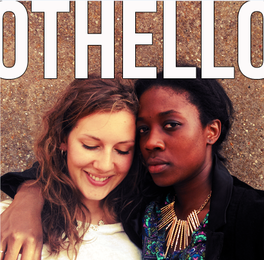
The programme explained the rationale further - within Shakespeare strong female characters are limited - "Your options generally are limited to becoming a mad mother, spending most of your time crying, being driven mad or turning to suicide." This production aims to not only recast Othello but also to expand other female roles, reframing the story. To do this, director and writer SJ Brady has created new text, weaving this into the original play and re-ordering some parts, setting the story in the modern-day British army.
The expanded female parts give us new ways of looking at the tragedy. I've always found both Desdemona and Emilia difficult to empathise with. Too often portrayed as wet, weak pawns swept up in the events around them, here they shine much more. Still swept up in the events around them, but with actions that make sense.
Kate Hunter's Desdemona is young, virginal, naive - but head over heels in love with Othello. Scared of what her family will think of the relationship, but committed and sure enough to pursue it and follow Othello to her new posting after they marry.
| Tara Howard shone as Emilia. Without a single word in the first scene where she's on stage she conveys her frustration and embarrassment at lairy husband Iago, getting drunk and lewdly holding court. | I would love to see a version that explored tensions within a lesbian community. |
And I can't mention Iago without talking about the way in which Richard de Lisle commanded the stage during every scene he was in. His Iago is a magnificent bastard, consumed by jealousy that Othello has chosen Cassio as her lieutenant rather than him, and seeing his chance to make trouble for her using her new relationship.
But it did also make me think...I'd love to see an all-female version of Othello now, or one where Iago was also female. De Lisle was so good that it seems churlish to complain that this role wasn't played by a woman - but I would love to see a version that explored tensions within a lesbian community. Perhaps with Desdemona portrayed as bisexual, and Othello's worries about what that means - surely this means she's going to leave her for a man?
Making me think of other versions of the play I'd like to see wasn't down to a failing in this one. Quite the opposite. My experience has often been that learning Shakespeare at school sucks out the power and beauty - large themes are reduced to set questions and the drama evaporates under the dodgy school lights.
Sometimes we might never get that back. I love a lot of Shakespeare, but Othello has always been a play that I've slightly struggled with, not liking any of the characters. By Jove gave me the opportunity to experience a version I could reconnect with, with characters I could understand, sympathise with, hate and root for.
Squeamish Louise


 RSS Feed
RSS Feed
